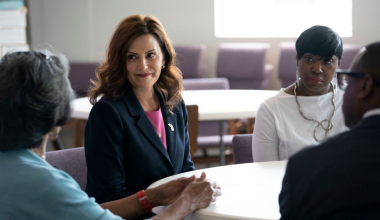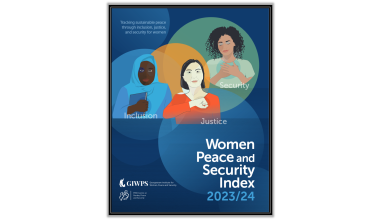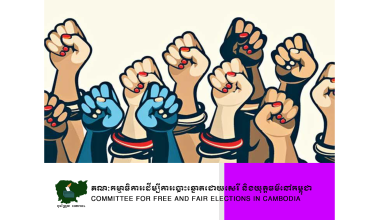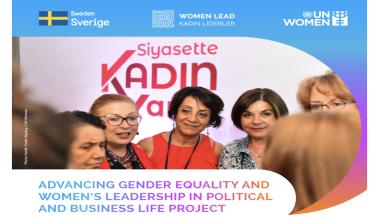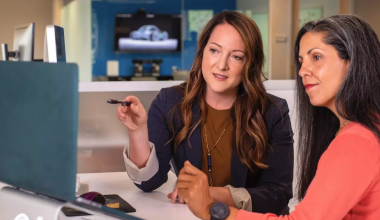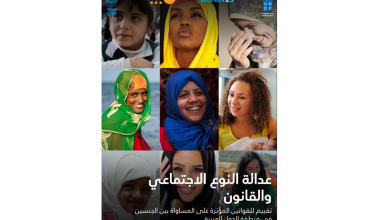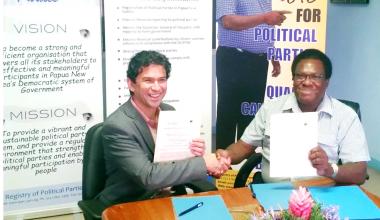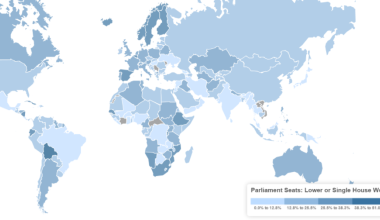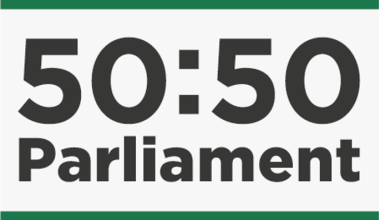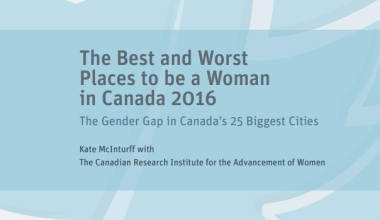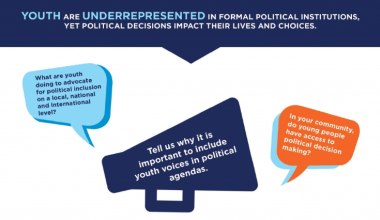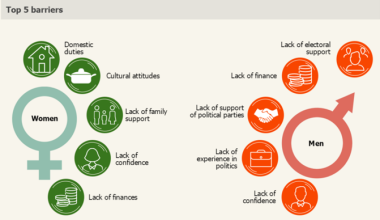Advocacy & Lobbying
Main navigation
Over 60 percent of Americans support abortion rights—but last year Roe was overturned and 14 states now ban abortions in most circumstances. A president who lost the popular vote by millions appointed three staunch opponents of abortion to the Supreme Court, who joined two right-wing members of the Court to overturn a half-century-old constitutional right to abortion. Then politicians in states with high levels of gerrymandering and voter suppression—such as Texas, Louisiana and West Virginia—banned abortion.
One reason women are losing the right to abortion is that men who do not support women’s rights have supermajority control of most state legislatures and Congress.
In states banning abortion, women’s political representation is remarkably low.
Click here to read the full article published by Ms Magazine on 3 January 2024.
The 2023 edition of the global Women Peace and Security Index (WPS Index) scores and ranks 177 countries in terms of women’s inclusion, justice, and security.
No country performs perfectly on the WPS Index and the results reveal wide disparities across countries, regions, and indicators. The WPS Index offers a tool for identifying where resources and accountability are needed most to advance women’s status - which benefits us all.
The WPS Index is published by the Georgetown Institute for Women, Peace and Security and the PRIO Centre on Gender, Peace and Security with support from the Norwegian Ministry of Foreign Affairs.
Click here to read the full report published by the Georgetown Institute for Women, Peace and Security and the PRIO Centre on Gender, Peace and Security on 26 October 2023.
Cambodian women remain to face different forms of discrimination and violence against them in their political participation and interests; it is a serious issue although their political rights and participation are fully guaranteed by the Cambodian Constitution and the International Convention on the Elimination of All Forms of Discrimination Against Women (CEDAW). Representation and meaningful participation of Cambodian women in politics and political leadership remains low compared to their male counterparts at all levels. Despite that, 80 percent of the survey participants acknowledged that women’s participation in politics is crucial, especially for elections in Cambodia toward equitable and inclusive development of the country.
The findings show that 71% of the participants experienced violence against women in politics (VAWIP). The study showed that women in politics both in the ruling party, opposition party, and other parties face the violence of multiple types, dimensions and at all levels. Both female commune councillors and female parliamentarians experienced violence against them but in different forms and degrees. The violence against female commune councillors and female parliamentarians from the opposition party (i.e., former CNRP) is more obvious, dreadful, and frequent than women in the ruling party or other small parties. In the meantime, the female commune councillors experienced more abusive and direct violence against them than the female parliamentarians.
Click here to access the full report.
This project brief presents a short description of the Advancing Gender Equality and Women's Leadership in Political and Business Life Project implemented by UN Women Turkey with the financial support of Sweden through the Swedish International Development Cooperation Agency.
The project's overall objective is to advance women’s leadership and participation in decision-making in Turkey by focusing on key stakeholders and actors in the fields of politics and the private sector.
Click here to access the report published by UN Women.
- Gender equality has suffered since the pandemic began.
- It will now take an estimated 135.6 years to close the worldwide gender gap between men and women.
- However, progress is being made in areas including science and politics.
- Improving paternity policies and representation of women will help.
There is still a huge amount of work to do to achieve gender equality around the world.
The time it will take to close the gender gap grew by 36 years in just 12 months, according to the World Economic Forum’s Global Gender Gap Report 2021. This means it will now take an estimated 135.6 years for men and women to reach parity, according to the report, which assesses areas including economic participation and opportunity, educational attainment, health and political empowerment.
Click here to read the full article published by The World Economic Forum on 3 March 2022.
Conducted by UNDP, UN Women, UNFPA, and ESCWA, this study on Gender Justice & the Law in the Arab States Region provides a comprehensive assessment of laws and policies affecting gender equality and protection against gender-based violence in Arab countries. The report is composed of 18 country profiles, each of which maps a country’s key legislative developments and gaps regarding gender justice. This introduction provides an overall summary of these country chapters followed by a summary of each country examined.
Algeria: Country Summary (AR | EN) Country Assessment (AR | EN)
Bahrain: Country Summary (AR | EN) Country Assessment (AR | EN)
Djibouti: Country Summary (AR | EN) Country Assessment (AR | EN)
Egypt: Country Summary (AR | EN) Country Assessment (AR | EN)
Iraq: Country Summary (AR | EN) Country Assessment (AR | EN)
Jordan: Country Summary (AR | EN) Country Assessment (AR | EN)
Lebanon: Country Summary (AR | EN) Country Assessment (AR | EN)
Libya: Country Summary (AR | EN) Country Assessment (AR | EN)
Morocco: Country Summary (AR | EN) Country Assessment (AR | EN)
Oman: Country Summary (AR | EN) Country Assessment (AR | EN)
Palestine: Country Summary (AR | EN) Country Assessment (AR | EN)
Qatar: Country Summary (AR | EN) Country Assessment (AR | EN)
Saudi Arabia: Country Summary (AR | EN) Country Assessment (AR | EN)
Somalia: Country Summary (AR | EN) Country Assessment (AR | EN)
Sudan: Country Summary (AR | EN) Country Assessment (AR | EN)
Syria: Country Summary (AR | EN) Country Assessment (AR | EN)
Tunisia: Country Summary (AR | EN) Country Assessment (AR | EN)
Yemen: Country Summary (AR | EN) Country Assessment (AR | EN)
Source: UN Women
A Memorandum of Understanding was signed in August 2017 by Dr Alphonse Gelu, Registrar of Political Parties and the Integrity of Political Parties and Candidates Commission, and Professor Michael Wesley, Dean of the Australian National University (ANU) College of Asia and the Pacific, committing both organisations to work together to improve women’s leadership and political participation in Papua New Guinea.
Dr Gelu said he was pleased to be working with the ANU’s State, Society and Governance in Melanesia (SSGM) program to deliver the five-year Women in Leadership Support Program. Dr Gelu noted that this program, along with the Commission’s work to strengthen women’s inclusion in political parties are important because we need senior male leaders to work with women to drive change and address the barriers to greater political participation for women.
Click here to learn more.
Using data to bridge the gender gap
Globally, women make up 49.7% of the population but hold only 22% of public offices. The Women in Public Service Project Data Portal seeks to answer why this is so, and how to increase the percentage of women in public office to 50% by 2050.
Click here to visit the data portal http://data.50x50movement.org/.
50:50 Parliament launched #AskHerToStand, a campaign to address the overwhelming gender imbalance in Parliament by encouraging everyone to ask talented and inspirational women to stand as Parliamentary candidates.
50:50 Parliament is working with The Parliament Project, who can offer more support, advice and training at their fabulous workshops. If you’d like to attend a workshop, contact the Parliament Project at help@parliamentproject.com.
Click here for more details.
This annual study provides a snapshot of the gaps in men and women’s access to economic security, personal security, education, health, and positions of leadership in Canada’s largest 25 metropolitan areas. It measures these gaps in a given community in order to capture inequalities that can be attributed, at least in part, to discrimination based on gender; it also serves as a reminder that, with the right choices and policies, these gaps can be closed.
According to this year's ranking, Victoria is the best city to be a woman (for the second year in a row), while big gaps in employment and high poverty rates for women put Windsor in last place. It is clear that progress is uneven. Equally clear is that there is much that cities have to learn from one another. Why do women fare better in politics in Victoria? What could we learn from Montreal about closing the wage gap? Which city is doing the most to create jobs for both men and women in a period of slow economic growth?
Click here to access the study.
· Young people are not at the center of political decision making even though almost half the world’s population is under 30 years old. [UNDP, 2013, http://bit.ly/1dd2a2L]
· Globally, less than 6% of the parliamentarians are under 35 years old [UNDP, Fast Facts: Civic Engagement and Participation of Youth in Politics and Public Institutions, 2014, p.1, http://www.undp.org/content/undp/en/home/librarypage/results/fast_facts/Fast-Facts-youth-civic-engagement-and-participation/]
· Globally, less than 2 per cent of parliamentarians are under 30 years old. [SDG indicator 16.7.1; Inter-Parliamentary Union, 2016: Youth participation in national parliaments, 2016, http://goo.gl/A83XGf]
· The average age in parliament in 53 years old. [UNDP, 2013, http://bit.ly/1dd2a2L]
· Only 1.65% of parliamentarians around the world are in their 20’s and for a third of countries, eligibility for national parliament starts at 25 years old. [UNDP, 2013, http://bit.ly/1dd2a2L]
· Voter turnout among 18-25 year olds continues to be lower than other age groups [UNDP, Fast Facts: Civic Engagement and Participation of Youth in Politics and Public Institutions, 2014, p.1, http://www.undp.org/content/undp/en/home/librarypage/results/fast_facts/Fast-Facts-youth-civic-engagement-and-participation/]
[[{"fid":"10718","view_mode":"default","fields":{"format":"default","field_file_image_alt_text[und][0][value]":"","field_file_image_title_text[und][0][value]":""},"type":"media","link_text":null,"attributes":{"style":"display: block; margin-left: auto; margin-right: auto;","class":"media-element file-default"}}]]
· 2 out of 3 countries DO NOT consult young people as a part of the process of preparing poverty reduction strategies or national development plans. [The Global Youth Call “Prioritizing Youth in the Post-2015 Development Agenda,” http://www.un.org/youthenvoy/wp-content/uploads/2014/09/The_Global_Youth_Call.pdf]
Source:
http://www.un.org/youthenvoy/wp-content/uploads/2015/06/YouthStatsPublicandCivicParticipation1.pdf
The Compendium of Good Practices on Advancing Women’s Political Participation in the OSCE Region, compiled on the occasion of the 20th anniversary of the Beijing Declaration and Platform for Action, presents good practices for enhancing women’s participation in parliaments, political parties, elections and local politics in the OSCE region.
Learn more about the challenges facing women in politics in our infographic, which is based on statistical data in the compendium. Click here to access the high resolution version of the visual.
[[{"fid":"10688","view_mode":"default","fields":{"format":"default","field_file_image_alt_text[und][0][value]":"","field_file_image_title_text[und][0][value]":""},"type":"media","link_text":null,"attributes":{"style":"display: block; margin-left: auto; margin-right: auto;","class":"media-element file-default"}}]]
